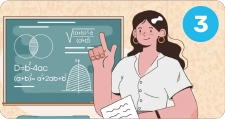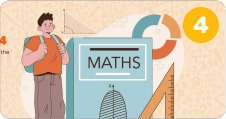Math anxiety is a common condition affecting millions of students and adults worldwide. According to recent research, 20% of the population suffers from math anxiety, a person’s tension, and fears when confronted with mathematics. It can cause a lack of confidence and poor math performance, affecting the student’s working memory.
Math anxiety can disrupt elementary and secondary school students working memory. If the person cannot utilize their working memory, they cannot calculate without the device. It is possible for children and adults who do not struggle with math anxiety to develop positive study habits, leading to achieving their academic goals more easily.
Would you like to know more about math anxiety? Read this post! We will discuss math anxiety symptoms, causes, and tips to overcome this.
What does Math anxiety mean?
Math anxiety occurs in response to math or math-related situations, reports American Psychological Association. Individuals with math anxiety can struggle to calculate restaurant bills and others.
The researcher believes that negative experiences regarding math can cause math anxiety, such as poor performance in math assessments. In addition, ADHD and other conditions can make math difficult that improve math anxiety.
Symptoms of Math Anxiety
Math anxiety can be noticeable in various methods, and the signs can differ according to several factors. The followings are some symptoms of math anxiety:
1. Negative self-talk
The person with math anxiety can limit their ability by negative self-talk such as, “I will not score well in math, I hate math, or I will fail.” Negative self-talk can become all-encompassing within a student’s mind.
2. Physical symptoms
Recent research on psychology and behavior management shows that students with arithmetic anxiety might have physical symptoms. It includes tension and fear, increased heart rate, sweating, shortness of breath, and other symptoms. The mere thought of solving mathematics problems can trigger the symptoms.
3. Poor performance
If we lack confidence, we cannot answer all math questions correctly in the exam. So, math anxiety can lead to poor mathematics performance even if the student prepares well for the test. The students are affected so badly, badly; they are unable to focus on tasks, recall formulas and solve problems.
4. Panic of judgment
People suffering from math anxiety might fear being evaluated by teachers or others for their capability in math. It can worsen their anxiety.
5. Avoidance
Such people avoid math classes, assignments, and tests. In addition, they stay away from careers involving mathematics, like accounting, engineering, and more.
6. Lack of confidence
Students are so overwhelmed that they imagine they can never solve any math problems. They start depending on others to complete their math tasks, such as parents or siblings, or classmates.
Causes of math anxiety
There are many causes of math anxiety that everyone must know. The followings are some causes of math anxiety:
1. Negative experiences in the classroom
Recent research indicates that a negative classroom experience with mathematics can trigger math anxiety in students. For instance, if a student performs poorly on a math exam or feels intimidated by their math teacher, they may develop a fear of the subject. Additionally, making mistakes in front of peers can result in feelings of inferiority.
2. Learning style
Some students may struggle with understanding mathematical concepts due to their learning style not being suited to the subject. This can result in math anxiety and feelings of frustration. To mitigate these challenges, parents can help by selecting a learning style that aligns with their child’s strengths and preferences.
3. Math performance
Over 40 studies have established a correlation between math anxiety and academic performance. Students who need to excel in mathematics may experience math anxiety. This pressure to perform can come from various sources, including tutors, parents, and others.
4. Inability to finish homework
Students who believe that they are unable to complete math homework accurately may experience math anxiety. This can occur in both children and adults.
5. Dyscalculia
Dyscalculia is a learning disability that can make arithmetic and other math-related tasks challenging. This condition can impact an individual’s ability to perform operations such as addition, subtraction, multiplication, division, and more.
How to overcome math anxiety
Students can develop the necessary skills to manage math anxiety with accurate analysis and treatment. Consistent practice can also be beneficial in overcoming math anxiety and achieving success in mathematics.
If a student is struggling with math anxiety, there are effective strategies that can be implemented to help them overcome it. Here are some tips on how to beat math anxiety and improve mathematical skills:
1. Identify negative self-talk
The first step to overcoming math anxiety is identifying negative self-talk. Rather than believing that they are not good at mathematics, students can study formulas and try solving problems.
2. Practice regularly
Regular practice helps in boosting confidence. Whether a student is completing homework assignments, reviewing topics, or working on challenging math problems, it is important to set aside time every day for consistent math practice.
3. Pick the right learning method
Everyone studies differently, so trying various methods like books, hands-on activities, videos, and more is essential. It will help in finding the appropriate learning method suitable for them, and thus it will reduce anxiety.
4. Get the teacher’s help
Encourage students to seek help from their math teacher if they struggle with a particular concept. In addition, they can utilize online resources. Enroll in a study group for additional support. Personalized learning solutions can be helpful in the understanding of concepts.
Recommended Reading: Important Math Formulas Students Should Know
5. Reframe anxiety
If you need to increase math performance, you can reframe anxiety. Ask students to write down their worries about mathematics before doing it. They can realize their unfounded fears and overcome them.
6. Utilize visualization techniques
Visualizing techniques can boost students’ confidence in solving math problems, making it easier to excel in exams and achieve high scores. By leveraging visualization methods, they can enhance their problem-solving skills and perform better in math assessments.
7. Take a short break
It is important to pause during your study session to relax. Such pauses improve attention and aid in a clear grasp of things.
Final words
You can use the information to bust math anxiety. Math anxiety can be a difficult condition that impacts knowledge, and it can also lead to poor performance or affect mental health.
So, it is better to solve the problem in the beginning.
Moonpreneur understands the needs and demands this rapidly changing technological world is bringing with it for our kids. Our expert-designed Advanced Math course for grades 3rd, 4th, 5th, and 6th will help your child develop math skills with hands-on lessons, excite them to learn, and help them build real-life applications.
Register for a free 60-minute Advanced Math Workshop today!













I came across the 3-3-3 rule for anxiety… any idea how it works?
The rule asks them to name three things they can see, identify three sounds they can hear, and move three different parts of their bodies. It’s an enjoyable activity that distracts children from their worries and refocuses them on the here and now.